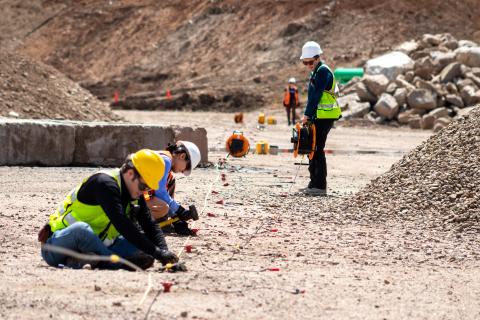All Categories
Featured
Table of Contents
Geophysicist in Melville WA 2023

The main design for the radial structure of the interior of the Earth is the preliminary referral Earth design (PREM). Some parts of this model have been upgraded by current findings in mineral physics (see post-perovskite) and supplemented by seismic tomography. The mantle is primarily composed of silicates, and the limits between layers of the mantle follow phase transitions.

Schematic of Earth's magnetosphere. Circulations from left to.
Inside the magnetosphere, there are fairly thick regions of solar wind particles called the Van Allen radiation belts. Geophysical measurements are generally at a particular time and location. Precise measurements of position, together with earth contortion and gravity, are the province of geodesy. While geodesy and geophysics are separate fields, the two are so closely connected that lots of scientific companies such as the American Geophysical Union, the Canadian Geophysical Union and the International Union of Geodesy and Geophysics encompass both.
Geophysical Survey Services in Safety Bay Aus 2023
, combines huge coordinates and the regional gravity vector to get geodetic collaborates. This approach only offers the position in two collaborates and is more challenging to utilize than GPS.
Relative positions of two or more points can be determined utilizing very-long-baseline interferometry. Gravity measurements entered into geodesy because they were required to related measurements at the surface area of the Earth to the reference coordinate system. Gravity measurements on land can be made using gravimeters released either on the surface or in helicopter flyovers.
, which are studied through geophysics and area physics.
Geophysicist Job Description in North Beach Aus 2022

Considering that geophysics is worried with the shape of the Earth, and by extension the mapping of functions around and in the planet, geophysical measurements include high precision GPS measurements. As soon as the geophysical measurements have actually been processed and inverted, the translated results are outlined utilizing GIS.
Lots of geophysics business have actually designed in-house geophysics programs that pre-date Arc, GIS and Geo, Soft in order to meet the visualization requirements of a geophysical dataset. Exploration geophysics is used geophysics that often uses remote picking up platforms such as; satellites, airplane, ships, boats, rovers, drones, borehole picking up devices, and seismic receivers.
Aeromagnetic information (aircraft gathered magnetic data) gathered utilizing conventional fixed-wing airplane platforms need to be fixed for electromagnetic eddy currents that are created as the aircraft moves through Earth's electromagnetic field. There are also corrections connected to changes in measured potential field strength as the Earth turns, as the Earth orbits the Sun, and as the moon orbits the Earth.
Geophysics in Calista Oz 2023
Signal processing involves the correction of time-series data for unwanted sound or mistakes presented by the measurement platform, such as aircraft vibrations in gravity data. It also involves the decrease of sources of sound, such as diurnal corrections in magnetic information. In seismic data, electro-magnetic information, and gravity information, processing continues after mistake corrections to include computational geophysics which lead to the final analysis of the geophysical information into a geological interpretation of the geophysical measurements Geophysics emerged as a separate discipline only in the 19th century, from the intersection of physical location, geology, astronomy, meteorology, and physics.
The magnetic compass existed in China back as far as the 4th century BC. It was used as much for feng shui as for navigation on land. It was not until good steel needles might be forged that compasses were used for navigation at sea; prior to that, they might not retain their magnetism enough time to be beneficial.
By looking at which of eight toads had the ball, one might figure out the instructions of the earthquake. It was 1571 years prior to the first style for a seismoscope was published in Europe, by Jean de la Hautefeuille. It was never ever built. One of the publications that marked the start of modern-day science was William Gilbert's (1600 ), a report of a series of precise experiments in magnetism.
Your Degree In Geophysics in Hamersley WA 2020
In 1687 Isaac Newton released his, which not just laid the foundations for classical mechanics and gravitation Also described a variety of geophysical phenomena such as the tides and the precession of the equinox. The first seismometer, an instrument capable of keeping a constant record of seismic activity, was built by James Forbes in 1844. Dietmar; Sdrolias, Maria; Gaina, Carmen; Roest, Walter R. (April 2008). "Age, spreading rates, and spreading asymmetry of the world's ocean crust". Geochemistry, Geophysics, Geosystems. 9 (4 ): Q04006. Bibcode:2008 GGG ... 9. 4006M. doi:10. 1029/2007GC001743. S2CID 15960331. "Earth's Inconstant Electromagnetic field". science@nasa. National Aeronautics and Space Administration. 29 December 2003. Retrieved 13 November 2018.
Runcorn, S.K, (editor-in-chief), 1967, International dictionary of geophysics:. Pergamon, Oxford, 2 volumes, 1,728 pp., 730 fig Geophysics, 1970, Encyclopaedia Britannica, Vol. Introduction to seismology (2nd ed.).
Latest Posts
Geophysicist - Job Role - Job Information in Mahogany Creek Oz 2023
Integrated Geophysical Surveys For The Safety in Koondoola Oz 2020
What Does A Geologist Do? in Pickering Brook WA 2021